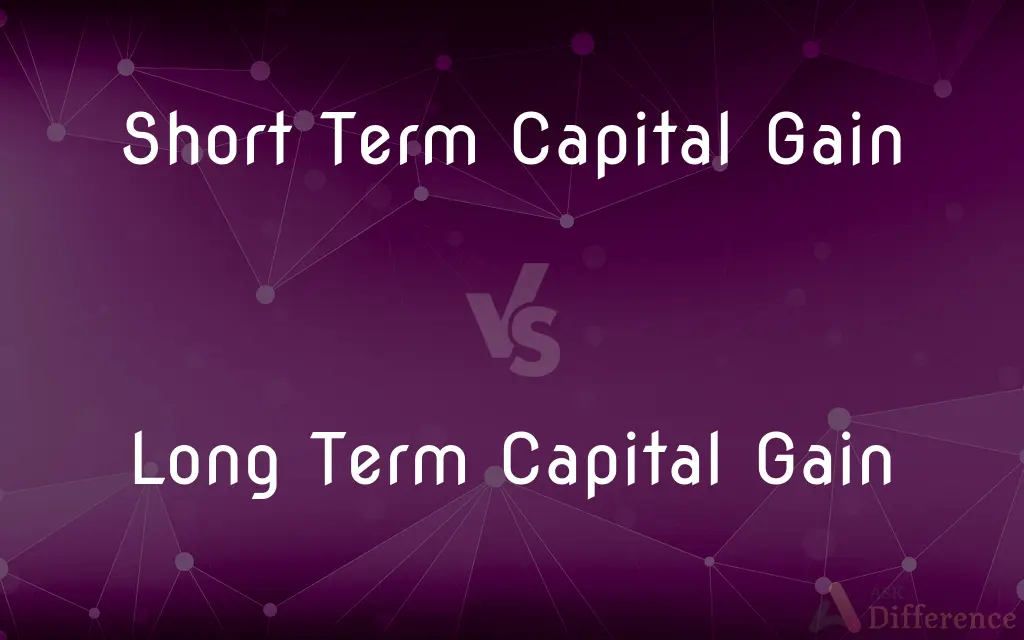Short Term Capital Gain vs. Long Term Capital Gain — What's the Difference?
Edited by Tayyaba Rehman — By Fiza Rafique — Published on January 13, 2024
Short Term Capital Gain arises from the sale of an asset held for a year or less; Long Term Capital Gain is from assets held for more than a year.

Difference Between Short Term Capital Gain and Long Term Capital Gain
Table of Contents
ADVERTISEMENT
Key Differences
Short Term Capital Gain refers to the profit realized from the sale of an asset, like stocks or real estate, held for one year or less. On the other hand, Long Term Capital Gain pertains to the profit from assets that have been in possession for more than one year.
For investors, understanding the difference between Short Term Capital Gain and Long Term Capital Gain is crucial as it impacts their tax liabilities. Typically, short-term gains are taxed at a higher rate than long-term gains, making the duration an asset is held quite significant.
When considering Short Term Capital Gain, one must recognize its fleeting nature. Assets generating these gains have been held for a relatively short duration. Conversely, assets yielding Long Term Capital Gain reflect a more extended commitment, signifying longer-term investment strategies.
The categorization into Short Term Capital Gain or Long Term Capital Gain has financial implications. While both represent profits, their tax treatment varies in many jurisdictions, often incentivizing long-term investments due to the favorable tax rates associated with Long Term Capital Gain.
Strategically, investors might aim for Long Term Capital Gain to benefit from lower tax rates, while some might need liquidity or foresee market downturns and opt for Short Term Capital Gain. Both have their place in an investor's portfolio, depending on individual financial goals and market predictions.
ADVERTISEMENT
Comparison Chart
Holding Period
Assets held for one year or less
Assets held for more than one year
Tax Treatment
Typically taxed at a higher rate
Often taxed at a more favorable, lower rate
Investment Strategy Implication
Reflects short-term market predictions or liquidity need
Reflects long-term investment commitments
Financial Impact
May yield quicker returns but with higher tax liabilities
Potential for larger returns with reduced tax implications
Investor Mindset
Short-term financial goals or market shifts
Long-term financial growth and stability
Compare with Definitions
Short Term Capital Gain
Short Term Capital Gain reflects quick sale of investments.
Due to an immediate need, he realized a Short Term Capital Gain from his property.
Long Term Capital Gain
Long Term Capital Gain reflects patient, long-term strategies.
Through market ups and downs, they held on, resulting in a Long Term Capital Gain.
Short Term Capital Gain
Short Term Capital Gain suggests short-term investment strategies.
Market predictions led to her Short Term Capital Gain from the tech stocks.
Long Term Capital Gain
Long Term Capital Gain arises from assets owned over a year.
He experienced a Long Term Capital Gain from the sale of his 5-year-old investment property.
Short Term Capital Gain
Short Term Capital Gain often meets immediate financial objectives.
To purchase a new home, they realized a Short Term Capital Gain by selling their old one.
Long Term Capital Gain
Long Term Capital Gain often enjoys favorable tax treatments.
Their portfolio's Long Term Capital Gain meant fewer taxes than if sold earlier.
Short Term Capital Gain
Short Term Capital Gain is profit from assets held for up to a year.
She incurred a Short Term Capital Gain from stocks sold within 8 months.
Long Term Capital Gain
Long Term Capital Gain usually aligns with long-term financial goals.
For their retirement, they focused on assets yielding Long Term Capital Gain.
Short Term Capital Gain
Short Term Capital Gain is subjected to specific tax rates, often higher.
Their Short Term Capital Gain from the bond sale increased their tax liability.
Long Term Capital Gain
Long Term Capital Gain indicates long-standing investments.
Her shares matured into a Long Term Capital Gain after a decade.
Common Curiosities
What is Short Term Capital Gain?
Short Term Capital Gain is profit from the sale of an asset held for one year or less.
What defines a Long Term Capital Gain?
Long Term Capital Gain is the profit from selling assets held for more than one year.
Why might an investor aim for a Long Term Capital Gain?
Investors might target Long Term Capital Gain for its potential larger returns and favorable tax treatments.
Why might governments tax Long Term Capital Gain at lower rates?
To incentivize long-term investments, which can promote economic stability and growth.
What's the risk associated with aiming solely for Long Term Capital Gain?
Market conditions can change, and long-term investments might not always yield positive returns.
How do tax rates typically differ for Short Term Capital Gain vs. Long Term Capital Gain?
Short Term Capital Gain usually incurs higher tax rates, while Long Term Capital Gain often benefits from lower rates.
Can the definition of Short Term vs. Long Term Capital Gain vary?
Yes, while the general distinction is based on one year, specific time frames might vary depending on the jurisdiction or asset type.
How does the market's condition impact Short Term Capital Gain decisions?
Market volatility might lead investors to sell quickly, realizing Short Term Capital Gain to avoid potential losses.
Can holding onto an asset for longer always guarantee Long Term Capital Gain?
No, the duration determines the type of gain, but market conditions affect whether it's a gain or loss.
Does the type of asset affect the distinction between Short Term and Long Term Capital Gain?
While the one-year rule is general, specific assets, like certain real estate, might have different criteria.
Are there ways to offset a Short Term Capital Gain?
Yes, capital losses can be used to offset gains, reducing taxable income.
How do Short Term Capital Gain and Long Term Capital Gain influence investment strategies?
Short Term Capital Gain might be pursued for quick returns, while Long Term Capital Gain aligns with long-term growth objectives.
How can one track whether a gain is short-term or long-term?
Maintaining detailed records of asset acquisition and sale dates helps determine the nature of the gain.
Can both Short Term and Long Term Capital Gain be realized in the same year?
Yes, depending on the sale of various assets, an investor can realize both types of gains in a single year.
Share Your Discovery

Previous Comparison
CSS vs. SCSS
Next Comparison
Log vs. LnAuthor Spotlight
Written by
Fiza RafiqueFiza Rafique is a skilled content writer at AskDifference.com, where she meticulously refines and enhances written pieces. Drawing from her vast editorial expertise, Fiza ensures clarity, accuracy, and precision in every article. Passionate about language, she continually seeks to elevate the quality of content for readers worldwide.
Edited by
Tayyaba RehmanTayyaba Rehman is a distinguished writer, currently serving as a primary contributor to askdifference.com. As a researcher in semantics and etymology, Tayyaba's passion for the complexity of languages and their distinctions has found a perfect home on the platform. Tayyaba delves into the intricacies of language, distinguishing between commonly confused words and phrases, thereby providing clarity for readers worldwide.















































